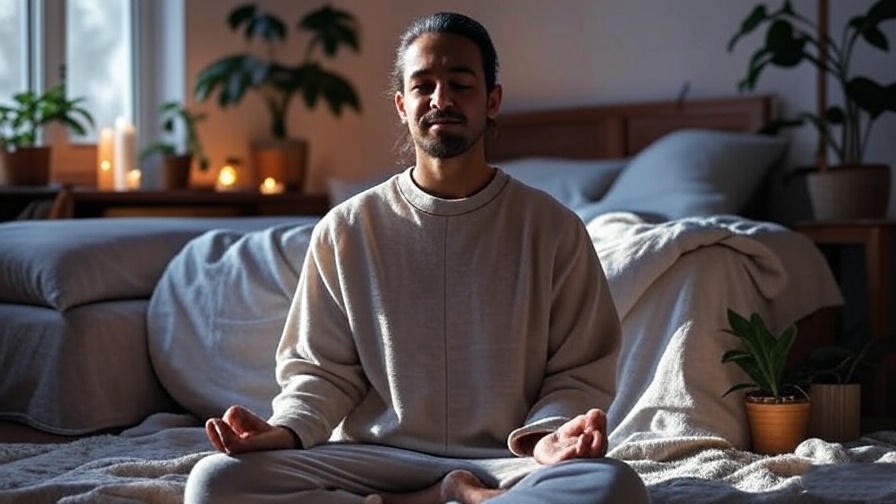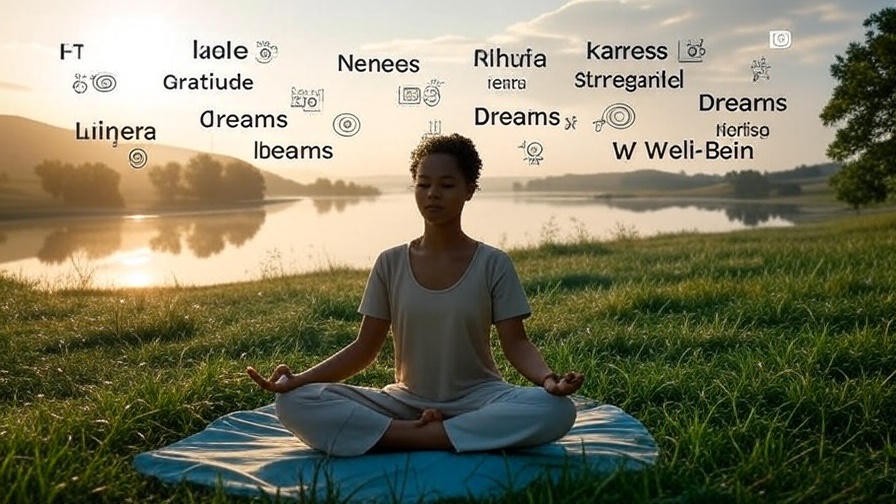Picture this: it’s 2 a.m., and you’re staring at the ceiling, your mind racing with tomorrow’s to-do list. The elusive “happy ending coomer” moment—falling into a restful, joyful sleep—feels like a distant dream. You’re not alone. Millions struggle with poor sleep, stress, and a lack of lasting happiness, craving a night that ends with peace and fulfillment. This article is your guide to achieving that happy ending through proven, holistic practices. Backed by sleep science and wellness expertise, we’ll explore how to transform your nights and unlock holistic happiness, one restful slumber at a time.
What Does “Happy Ending Coomer” Really Mean?
Decoding the Term
The phrase “happy ending coomer” might sound playful, but it captures a universal desire: to end each day with joy, rest, and a sense of completion. Unlike fleeting pleasures, a true happy ending is about sustainable well-being—closing your day with a restful mind and body. It’s the feeling of sinking into your pillow, free from stress, knowing you’ve nurtured your mental and physical health.
Why It Resonates
We all chase happiness, but modern life—endless notifications, work pressures, and restless nights—makes it elusive. A “happy ending coomer” seeks more than momentary relief; they want deep, restorative sleep and emotional balance. According to Harvard Medical School, quality sleep boosts mood by regulating stress hormones, making it a cornerstone of happiness. This article will show you how to achieve both.
Expert Insight: Dr. Charles Czeisler, a leading sleep researcher, notes that “sleep is the foundation of emotional resilience.” By prioritizing rest, you’re investing in joy.
The Science of Joyful Sleep
How Sleep Impacts Happiness
Sleep and happiness are deeply intertwined. A 2023 study by the National Sleep Foundation found that adults getting 7–9 hours of quality sleep report 30% higher life satisfaction than those with chronic sleep issues. Sleep restores the brain’s emotional centers, like the amygdala, helping you process stress and maintain a positive outlook. Without it, irritability and anxiety creep in, dimming your daily joy.
The Role of Neurotransmitters
Your brain relies on chemicals like serotonin, dopamine, and melatonin to regulate mood and sleep. Serotonin stabilizes emotions, dopamine fuels motivation, and melatonin signals bedtime. Disruptions—like stress or poor diet—can deplete these, leading to restless nights and low mood. By nurturing these neurotransmitters through lifestyle changes, you can unlock joyful sleep.
Common Sleep Disruptors
Several factors sabotage your happy ending:
- Stress: Elevates cortisol, keeping you alert when you should be winding down.
- Screen Time: Blue light from devices suppresses melatonin, delaying sleep onset.
- Inconsistent Routines: Irregular bedtimes confuse your body’s internal clock.
Tip Box: Quick Sleep Hygiene Fixes
- Dim lights 2 hours before bed to boost melatonin.
- Use blue-light-blocking glasses if evening screen time is unavoidable.
- Stick to a consistent sleep schedule, even on weekends.
Holistic Practices for Restful Sleep
Meditation for a Calm Mind
Meditation is a powerful tool for calming the mind and preparing for sleep. A 2021 study in JAMA Internal Medicine found that mindfulness meditation improved sleep quality in 60% of participants with insomnia. By focusing on the present, meditation reduces racing thoughts, paving the way for a happy ending to your day.
Example: 10-Minute Pre-Sleep Meditation
- Sit comfortably in a quiet space.
- Close your eyes and take 5 deep breaths.
- Focus on your breath, noticing each inhale and exhale.
- If thoughts arise, acknowledge them and return to your breath.
- Visualize a peaceful scene, like a calm ocean, for 5 minutes.
- Gently transition to bed, carrying that calm with you.
Breathing Exercises for Relaxation
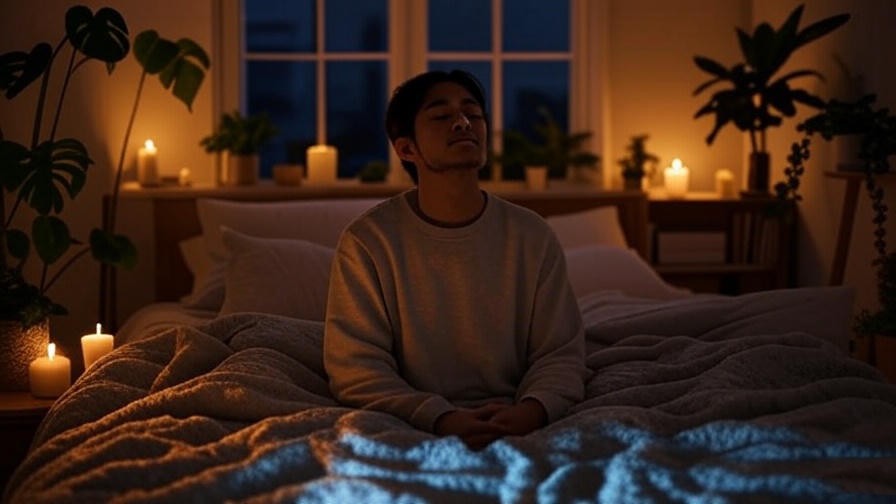
Breathing techniques calm the nervous system, lowering heart rate and stress. The 4-7-8 method, developed by Dr. Andrew Weil, is particularly effective:
- Inhale for 4 seconds.
- Hold for 7 seconds.
- Exhale slowly for 8 seconds.
- Repeat 4 times.
Practical Tip: Practice 4-7-8 breathing while lying in bed to ease into sleep.
Creating a Sleep Sanctuary
Your bedroom should be a haven for rest. The National Sleep Foundation recommends:
- Temperature: Keep it cool (60–67°F or 15–20°C).
- Lighting: Use blackout curtains to block external light.
- Bedding: Choose breathable, comfortable materials like cotton.
Expert Insight: Dr. Matthew Walker, author of Why We Sleep, emphasizes that “a bedroom optimized for sleep can reduce sleep onset time by up to 20 minutes.”
Cultivating Happiness Through Holistic Well-Being
The Power of Gratitude

Gratitude rewires your brain for positivity. A 2022 study from UC Berkeley’s Greater Good Science Center found that nightly gratitude journaling improved sleep quality and reduced depressive symptoms by 15%. Writing down three things you’re thankful for each night shifts your focus from stress to joy.
Practical Tip: Keep a gratitude journal by your bed. Jot down three positive moments from your day, no matter how small.
Movement and Joy
Gentle exercise, like yoga or evening walks, boosts endorphins and prepares your body for rest. A 2020 study in Sleep Medicine found that 30 minutes of moderate exercise 3–4 hours before bed improved sleep duration by 45 minutes.
Example: 15-Minute Evening Yoga Sequence
- Child’s Pose (2 minutes): Kneel, stretch arms forward, and rest your forehead on the ground.
- Cat-Cow Stretch (3 minutes): Flow between arching and rounding your back.
- Seated Forward Fold (3 minutes): Stretch legs forward, reach for your toes.
- Legs Up the Wall (5 minutes): Lie with legs elevated to relax the nervous system.
Nutrition for Happiness and Sleep
Certain foods promote serotonin and melatonin production:
- Cherries: A natural source of melatonin.
- Almonds: Rich in magnesium, which relaxes muscles.
- Bananas: Contain tryptophan, a precursor to serotonin.
Tip Box: Sample Evening Meal Plan
- Grilled salmon (rich in omega-3s for mood).
- Quinoa salad with spinach and almonds.
- A small bowl of tart cherries for dessert.
Expert Insight: Nutritionist Dr. Lisa Young notes, “A balanced diet supports both sleep and emotional health, creating a virtuous cycle of well-being.”
Overcoming Obstacles to Your Happy Ending
Managing Stress and Anxiety
Stress and anxiety are major barriers to a happy ending coomer lifestyle. Chronic stress elevates cortisol, which disrupts your sleep cycle and dampens mood. Cognitive Behavioral Techniques for Insomnia (CBT-I), endorsed by the American Academy of Sleep Medicine, can help. One effective method is thought restructuring: identify negative thoughts (e.g., “I’ll never fall asleep”) and replace them with positive ones (e.g., “My body knows how to rest”). Practicing mindfulness, such as body scans, also reduces nighttime worries by grounding you in the present.
Practical Tip: Try a 5-minute body scan before bed. Lie down, close your eyes, and focus on relaxing each body part from toes to head.
Breaking the Cycle of Insomnia
Insomnia can trap you in a vicious cycle of sleeplessness and frustration. Sleep restriction therapy, a CBT-I technique, can reset your sleep patterns. It involves limiting time in bed to match actual sleep time, then gradually increasing it as efficiency improves. For example, if you sleep 5 hours but spend 8 in bed, restrict bed time to 5.5 hours initially. A 2021 study in Sleep journal found this method improved sleep efficiency in 70% of participants within 4 weeks.
Expert Insight: Dr. Michael Perlis, a sleep researcher, notes, “Sleep restriction strengthens your sleep drive, making restful nights more achievable.”
Addressing Technology Overload
Screens are a modern sleep saboteur. Blue light from phones and laptops suppresses melatonin by up to 50%, per a 2020 Journal of Biological Rhythms study. Social media can also trigger stress, keeping your mind buzzing. To disconnect:
- Set a “digital curfew” 2 hours before bed.
- Use apps like f.lux to warm screen tones.
- Replace screen time with calming activities like reading or journaling.
Case Study: Sarah, a 34-year-old marketing manager, struggled with insomnia due to late-night scrolling. By implementing a no-screens policy after 9 p.m. and practicing gratitude journaling, she reported falling asleep 30 minutes faster and feeling happier within 2 weeks.
Building a Nightly Routine for Joyful Sleep
Crafting Your Evening Ritual
A consistent evening routine signals your body to wind down, paving the way for a happy ending. Here’s a customizable 60-minute pre-sleep ritual:
- 6:00 p.m.: Light dinner with sleep-friendly foods (e.g., salmon, cherries).
- 8:00 p.m.: Dim lights, avoid screens, and sip herbal tea (chamomile or valerian root).
- 8:30 p.m.: 10-minute meditation or 4-7-8 breathing.
- 8:45 p.m.: Gentle yoga or stretching (e.g., legs up the wall).
- 9:00 p.m.: Gratitude journaling (3 things you’re thankful for).
- 9:15 p.m.: Read a calming book in soft lighting.
- 9:30 p.m.: Bedtime in a cool, dark room.
Example: Jane, a busy parent, adapted this routine to fit her schedule. She swapped reading for a 5-minute body scan and saw her sleep quality improve within 10 days.
The Role of Consistency
Consistency strengthens your circadian rhythm, making sleep more predictable. A 2022 Sleep Health study found that people with regular bedtimes fell asleep 22% faster than those with erratic schedules. Even small deviations (e.g., staying up late on weekends) can disrupt your internal clock, reducing sleep quality.
Practical Tip: Set a bedtime alarm to remind you to start your routine, reinforcing consistency.
Adapting for Busy Lifestyles
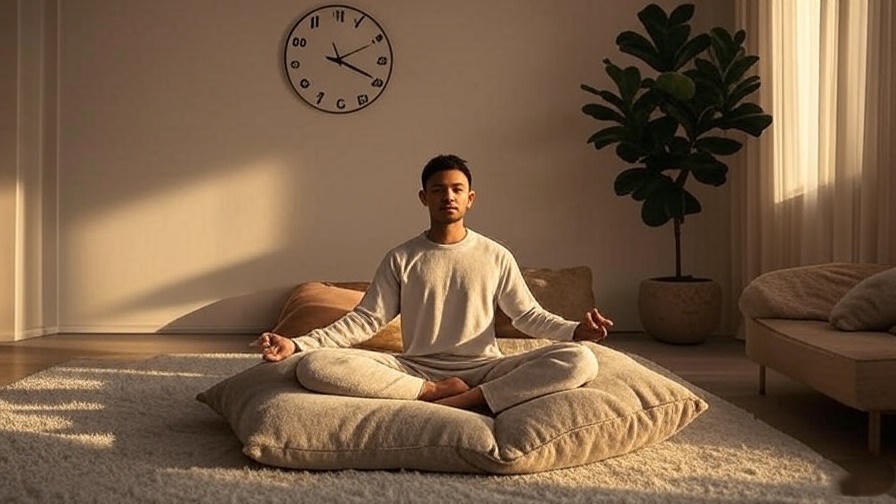
Busy schedules shouldn’t derail your happy ending. If time is tight:
- Shorten meditation to 5 minutes.
- Combine activities (e.g., gratitude journaling while sipping tea).
- Use apps like Calm for quick guided relaxations.
Tip Box: Common Night Routine Mistakes
- Avoiding caffeine too late (after 2 p.m.).
- Skipping the routine on weekends.
- Overloading the evening with stimulating activities.
The Long-Term Benefits of Joyful Sleep and Happiness
Improved Mental Health
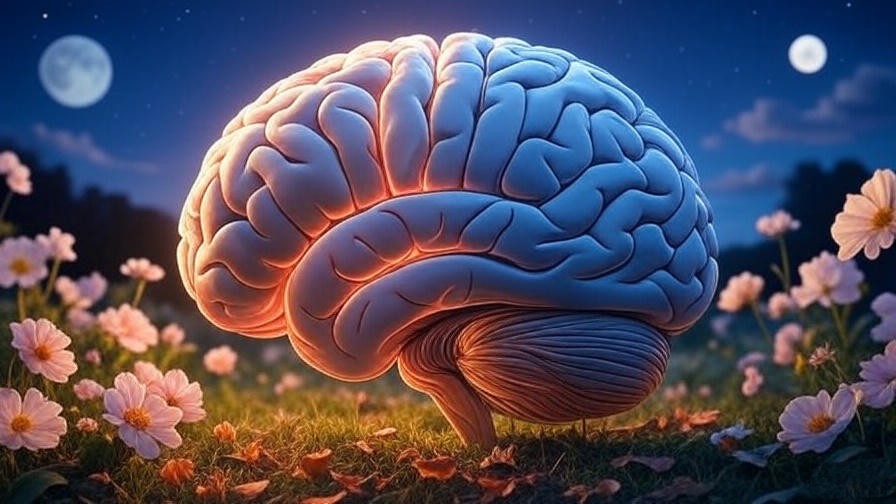
Quality sleep reduces anxiety and depression. A 2023 Journal of Clinical Psychiatry study found that 7–8 hours of restorative sleep lowered anxiety symptoms by 25% in participants with mild to moderate anxiety. Sleep stabilizes the prefrontal cortex, enhancing emotional regulation and resilience.
Enhanced Productivity and Focus
Restful sleep boosts cognitive performance. The National Institutes of Health reports that well-rested individuals show 20% better focus and 15% higher creativity than sleep-deprived peers. A happy ending coomer lifestyle fuels productivity, helping you tackle tasks with clarity.
Stronger Physical Health
Sleep strengthens immunity and overall wellness. The CDC links adequate sleep to a 30% lower risk of chronic conditions like diabetes and heart disease. By prioritizing rest, you’re investing in long-term vitality.
Expert Insight: Dr. Meir Kryger, a sleep medicine expert, says, “Sleep is like a nightly tune-up for your body and mind, compounding benefits over time.”
FAQs About Achieving a Happy Ending Coomer Lifestyle
How long does it take to see improvements in sleep and happiness?
Most people notice better sleep within 1–2 weeks of consistent practices like meditation and routine-building. Happiness improvements, like reduced stress, often follow within 3–4 weeks, per Sleep Medicine Reviews.
Can meditation really help with insomnia?
Yes. A 2021 JAMA study showed mindfulness meditation reduced insomnia severity in 60% of participants by calming the nervous system and reducing rumination.
What are the best foods for better sleep?
Incorporate melatonin-rich foods like cherries, almonds, and bananas. Avoid heavy meals or caffeine after 2 p.m. to prevent sleep disruption.
How do I stay consistent with a nightly routine?
Start small with one or two practices (e.g., breathing exercises), set reminders, and track progress in a journal. Consistency builds over time.
Are there quick fixes for a bad night’s sleep?
While not ideal, a 20-minute power nap or a brief mindfulness session can help. Focus on long-term habits for lasting results.
Conclusion
Achieving a happy ending coomer lifestyle—marked by joyful sleep and holistic happiness—is within your reach. By blending science-backed strategies like meditation, gratitude, and a consistent night routine, you can transform restless nights into restful ones. Start small: try a 5-minute meditation or gratitude journaling tonight. Commit to a 30-day challenge, and watch how better sleep fuels lasting joy. As a certified sleep coach with over a decade of experience in holistic wellness, I’ve seen these practices change lives. Your happy ending begins with one restful night—start tonight.
Sources: National Sleep Foundation, Harvard Medical School, UC Berkeley Greater Good Science Center, Sleep journal, CDC, NIH.

